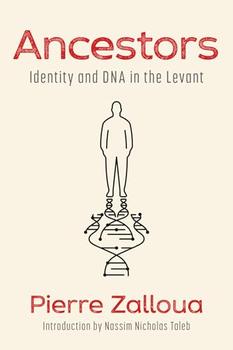
Identity and DNA in the Levant
by Pierre Zalloua
From a leading authority on population genetics, a deep dive into ancestry and origins in the Middle East that interrogates culture, identity, migration, and ethnicity to reframe what it means to be indigenous to any land.
In recent years, as companies like 23andMe and Ancestry.com have made genetic testing available across the globe, it has become relatively simple to find out where your ancestors came from.
But acclaimed geneticist Pierre Zalloua believes that these test results have led to a dangerous oversimplification of what one's genetic heritage means. People have conflated genetic ancestry with other ways of defining themselves such as "origin," "ethnicity," and even "race" but give no attention to the complexities that underlie these concepts.
Nowhere is this interplay more important, and more controversial, than in the Levant—an ancient region known as one of the cradles of civilization, and which now includes modern-day Palestine, Israel, Jordan, Lebanon, Syria, and parts of Turkey. Born in Lebanon, Zalloua grew up surrounded by people for whom this question of identity was one of life or death importance. In Ancestors, Zalloua uses the Levant to grapple with what being indigenous really means. He finds that DNA does not determine a culture or an ethnicity, but instead, one must look to their own history to understand their identity.
Building on years of research, Zalloua tells a history of the Levant through the framework of genetics that spans from 100,000 years ago, when humans first left Africa, to the 21st century and modern nation-states. World-shifting and accessible, Ancestors will reshape the way you think about where our culture really comes from.
"[Zalloua writes] with verve and feeling, even as he provides capsule histories of African and eastern Mediterranean communities and startling evidence that upends many of the most treasured assumptions about our cultural identities. A survey of population studies that is insightful, persuasive, and unfailingly humane." —Kirkus Reviews (starred review)
"Enthralling ... Zalloua brings urgency and humanism to the technical work of genetic analysis, arguing that genes offer a portrait of a past defined by constant change, and that twenty-first century humans would do well to learn from such fluidity and connection. The result is a singular blend of science and history that makes a powerful argument against present-day sectarianism and nationalism." —Publishers Weekly (starred review)
This information about Ancestors was first featured
in "The BookBrowse Review" - BookBrowse's membership magazine, and in our weekly "Publishing This Week" newsletter. Publication information is for the USA, and (unless stated otherwise) represents the first print edition. The reviews are necessarily limited to those that were available to us ahead of publication. If you are the publisher or author and feel that they do not properly reflect the range of media opinion now available, send us a message with the mainstream reviews that you would like to see added.
Any "Author Information" displayed below reflects the author's biography at the time this particular book was published.
Pierre Zalloua is a population geneticist focusing primarily on East Mediterranean populations. He earned his PhD in genetics from the University of California at Davis. He completed a three-year post-doctoral fellowship in population genetics at Harvard T.H. Chan School of Public Health where he is currently an adjunct professor. Pierre has served as the principal investigator for National Geographic's Genographic Project in the Middle East and North Africa and has authored and co-authored more than 200 peer-reviewed publications in the field of genetics. Some of his work has been featured in the New York Times, National Geographic, and most major international media outlets. He is featured in a documentary film about his work produced by National Geographic entitled Quest for the Phoenicians.
The secret of freedom lies in educating people, whereas the secret of tyranny is in keeping them ignorant
Click Here to find out who said this, as well as discovering other famous literary quotes!
Your guide toexceptional books
BookBrowse seeks out and recommends the best in contemporary fiction and nonfiction—books that not only engage and entertain but also deepen our understanding of ourselves and the world around us.